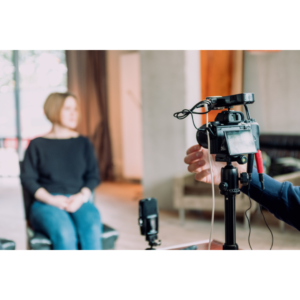Skilled Legal Videography for Legal Depositions.
The Duty of Legal Videography in Depositions and Trials
Legal videography has actually emerged as a crucial device in both depositions and trials, supplying a multifaceted technique to recording witness statements. As lawful professionals significantly identify its worth, it motivates a deeper examination of just how these visual documents can affect juror assumptions and trial end results.
Relevance of Legal Videography
Lawful videography plays a critical duty in the documentation and presentation of depositions and tests. This specialized area combines technological skills with legal knowledge to create a reliable record of process that can considerably influence case results. The appearance of legal videography boosts the understanding of witness statement, enabling jurors and judges to observe not only the talked words but likewise the demeanor, feelings, and body language of the witnesses.

The relevance of lawful videography expands beyond the court room; it additionally plays an important function in preserving proof for future reference, whether for allures or additional lawful activity. Therefore, its assimilation into the legal process is crucial for making sure a fair and precise depiction of the truths, eventually contributing to the quest of justice.

Refine of Legal Videography
While recording the subtleties of depositions and trials, the procedure of legal videography entails several essential actions that ensure top quality, accurate recordings. A professional legal videographer prepares by evaluating the situation materials and recognizing the particular needs of the deposition or trial. This prep work consists of acquainting themselves with the individuals and the context, which helps in catching important details.
On the day of the recording, the videographer establishes the required devices, which usually includes high-def cameras, microphones, and correct lighting. Guaranteeing optimum angles and sound top quality is important, as it directly affects the performance of the recording. The videographer connects with lawyers and individuals to develop procedures, ensuring that everyone comprehends the recording process.
Throughout the deposition or trial, the videographer meticulously tape-records the process, paying very close attention to both spoken and non-verbal cues. legal videography. This consists of catching the disposition and reactions of witnesses and attorneys. After the session ends, the videographer may modify the footage for clearness and conformity with legal requirements, producing an end product that precisely shows the process for future reference and usage in legal contexts
Advantages in Depositions
The incorporation of videography in depositions provides many benefits that improve the total procedure of collecting evidence. One primary advantage is the ability to record witness statements with visual and auditory fidelity, supplying a much more exact representation of the witness's demeanor, tone, and body language. This multidimensional technique permits lawyers and juries to examine trustworthiness better than standard written read review transcripts alone.
In addition, videographed depositions function as an effective tool for maintaining statement. Should a witness come to be not available for trial, their recorded deposition can be played in court, making certain that their evidence stays available and relevant. This facet dramatically decreases the danger of losing vital information that could affect case outcomes.
In addition, the use of legal videography advertises better prep work for attorneys. Reviewing video footage enables lawful groups to analyze and fine-tune their strategies, recognizing toughness and weaknesses in their instances. This preparatory benefit can lead to more compelling presentations in court.
Finally, videography boosts the general professionalism and reliability of the deposition process, instilling confidence in clients linked here relating to the thoroughness of their lawful depiction. By leveraging technology, legal experts can dramatically improve the performance of depositions.
Influence On Tests
In several tests, the assimilation of videography can substantially influence the discussion of proof and the jury's understanding. Legal videography captures witness testaments and critical evidence in a vibrant format, enabling jurors to engage with the product on numerous degrees. This aesthetic home component improves the narration element of a test, offering context and psychological vibration that typical text-based proof may do not have.
Furthermore, video clip recordings can work as effective devices for impeachment during interrogation. When inconsistencies occur between a witness's previous declarations and their courtroom statement, video proof offers an objective referral that can guide jurors' opinions. This immediacy and clearness can bolster the trustworthiness of an event's narrative while at the same time threatening opposing arguments.
Furthermore, using videography can aid streamline complicated info, making it extra obtainable to jurors who may battle to realize elaborate details provided solely through verbal statement. By combining visuals with auditory information, legal videography can boost retention and understanding, inevitably influencing the court's decision-making procedure. For that reason, the impact of videography in trials prolongs beyond simple aesthetics; it plays a vital function fit the lawful landscape and end results.
Future Trends in Legal Videography
As we look towards the future of legal videography, a number of emerging patterns guarantee to reshape its duty within the courtroom. One significant trend is the assimilation of man-made knowledge (AI) in video analysis and modifying - legal videography. AI can streamline the procedure of identifying crucial moments in recorded depositions, permitting lawyers to promptly access appropriate material, thus enhancing efficiency in instance preparation
Additionally, the surge of digital reality (VIRTUAL REALITY) and increased reality (AR) modern technologies is expected to change how jurors experience evidence. By immersing jurors in a substitute setting, these modern technologies can supply an extra extensive understanding of complex situations, resulting in even more enlightened considerations.

Additionally, the enhancing need for remote depositions, increased by the COVID-19 pandemic, will likely continue. Lawful videographers will certainly require to adjust to brand-new software program and platforms to make sure top notch recordings in virtual settings.
Lastly, the expanding emphasis on information protection will demand stricter procedures for storing and sharing video clip evidence. As the lawful landscape evolves, lawful videographers have to stay abreast of these patterns to preserve their significance and effectiveness in the judicial procedure.

Conclusion
In summary, legal videography serves an important feature in the judicial procedure, enhancing the integrity of depositions and tests. As technology proceeds to progress, legal videography is positioned to more change its function within the lawful landscape.